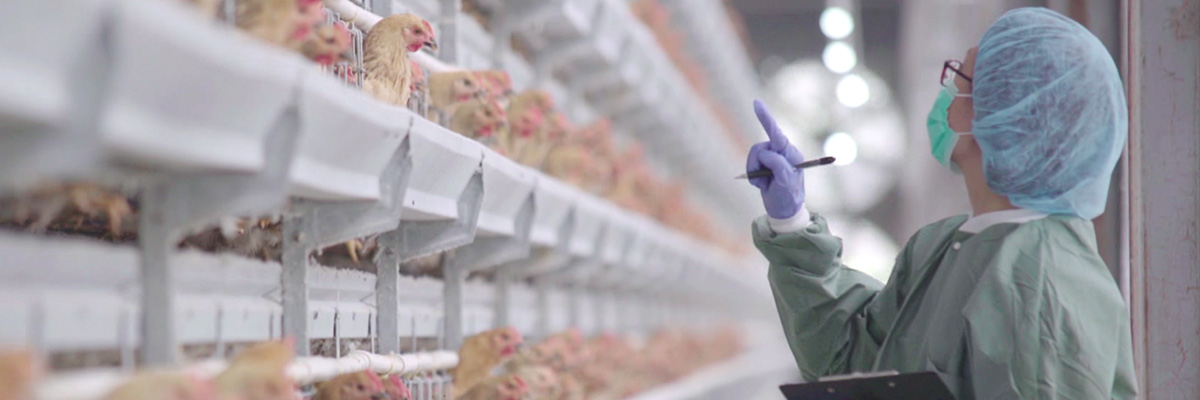

WORK OF THE INSPECTION AND QUARANTINE BRANCH
- To investigate and control outbreaks of animal diseases;
- To conduct livestock farm inspections;
- To manage the risk of antimicrobial resistance in local food animal farms;
- To provide veterinary diagnostic support and surveillance services for detecting diseases and drug residues in food animals;
- To regulate the importation of animals/plants and their products;
- To certify exportation of animals/plants and their products;
- To control and regulate the registration and sale of pesticides;
- To monitor and regulate the trade of animals; and
- To promote animal welfare and manage stray animals.
PREVENTION OF AVIAN INFLUENZA
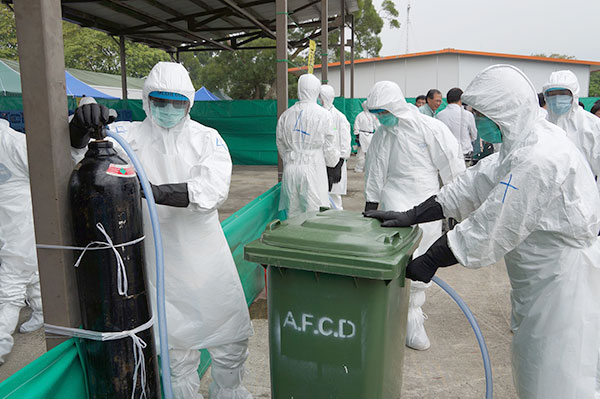
To safeguard the population against Avian Influenza (AI), the Department continued its year-round programme to monitor and screen for the presence of the virus at various sites considered to be at risk, including poultry farms, the wholesale poultry market, pet bird shops, recreational parks and nature reserves. Dead birds were collected and tested on a daily basis. In total, 5
Unauthorised keeping of backyard poultry (chickens, ducks, geese, pigeons and quails) is an offence with a maximum fine of $100,000. Departmental staff continued to patrol villages in rural areas to disseminate messages about AI prevention by putting up posters onto village information boards and distributing leaflets to villagers. Based on complaints received and irregularities spotted during routine patrol, blitz operations were conducted.
All imported pet birds entering Hong Kong have to be tested for AI before being released to their importers.
LIVESTOCK FARM INSPECTIONS
To protect the general population from AI, the Department has imposed stringent biosecurity requirements on local poultry farms in addition to the obligatory AI vaccination programme. Every batch of local farm chickens must pass the AI test before they are allowed to be sold in markets for consumption.
The Department carries out regular inspection to local poultry and pig farms and provides professional advice to farmers in terms of farm management, biosecurity, disease prevention and proper usage of veterinary drugs.
During the year, the departmental staff conducted 2
Antimicrobial Resistance Surveillance
To manage the risk of antimicrobial resistance (AMR) at the level of local food animal farms in accordance with the Hong Kong Strategy and Action Plan on Antimicrobial Resistance (2017-2022), the Department has established the Antimicrobial Resistance Surveillance Section (AMRSS) since April 2017 to carry out the relevant tasks.
At this stage, the tasks involve inspecting local food animal farms to gather information on antimicrobial usage (AMU) and collect samples to test for AMU and AMR microorganisms and conducting education and publicity programmes to enhance public awareness of the issue and to promote good practices among stakeholders. In 2017-18, the AMRSS inspected 28 chicken farms and 34 pig farms. A 15-month consultancy study was commissioned in October 2017 with the aim of devising appropriate sustainable surveillance systems for AMR and AMU on local livestock farms. Four seminars with overseas experts as speakers were organised for stakeholders while posters, pamphlets, advertisements and a variety of souvenirs were produced to raise awareness.
VETERINARY LABORATORY
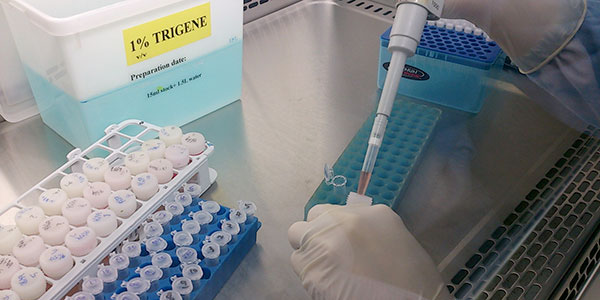
The Tai Lung Veterinary Laboratory provides veterinary diagnostic support services including testing of animal pathogens and chemical residues in pre-slaughter food animals. In 2017-18, over 10
ANIMAL AND PLANT QUARANTINE CONTROL
As the animal import and export control authority in Hong Kong, the Department is responsible for ensuring that all cross-border animal movements are closely monitored to prevent the introduction of animal diseases into Hong Kong.
Special permits issued by the Department are required for the import of live animals and birds in accordance with the Public Health (Animals and Birds) Ordinance (Cap 139) and the Rabies Ordinance (Cap 421). Importing animals and birds without a special permit is liable to prosecution. In 2017-18, 8
To comply with the import requirements of destination places, the Department issues Animal Health Certificates to facilitate the export of animals and birds. 4
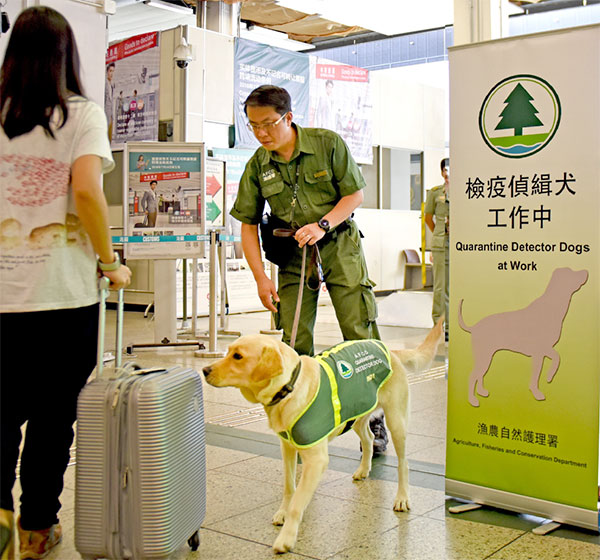
To strengthen the efforts to prevent illegal importation of animals and to safeguard public health, the Quarantine Detector Dog (QDD) Programme commenced operation in February 2008 and QDDs are now deployed at various boundary control points.
Under the Plant (Importation and Pest Control) Ordinance (Cap 207), any plant imported into Hong Kong must be accompanied by a Plant Import Licence issued by the Department and a valid Phytosanitary Certificate issued by the national plant protection organisation of the exporting territory. For importation of plant pests, an authorisation must be obtained in advance. 2
Statistics on plant import control and phytosanitary certification services are at Appendix 9.
CONTROL ON PESTICIDES
Carbofuran and Trichlorfon have been listed under the Rotterdam Convention on the Prior Informed Consent Procedure for Certain Hazardous Chemicals and Pesticides in International Trade since September 2017. In order to fulfill the Convention's requirement, the Department cancelled the registrations of the two pesticides and steps were taken to include them in Part 1 of Schedule 2 to the Pesticides Ordinance (Cap. 133).
To promote the safe and proper use of pesticides, the Department set up interactive game booths and held talks on "Safe and Proper Use of Pesticides" in publicity events. Such events included the Hong Kong Polytechnic University Safety Weeks, the Hong Kong North District Flower, Bird, Insect and Fish Show and the FarmFest. The Department also organised roving exhibitions titled "Be Smart about Using Pesticides - Follow Precautionary Rules" at lobbies of government offices and published the second edition of the booklet "Safe and Proper Use of Pesticides - Turf and Landscape Management" to educate the public of the safety precautions in handling pesticides.
Statistics on pesticide control are at Appendix 10.
PLANT VARIETIES PROTECTION
The Plant Varieties Protection Ordinance (Cap 490) provides plant breeders (or the owners of the variety) with legal means to apply for proprietary rights over cultivated plant varieties they bred and developed. Grantees are given the exclusive rights to import, export, produce for sale, offer for sale or sell reproductive materials of the protected variety for a term of 20 or 25 years.
ANIMAL MANAGEMENT
The Department adopts various animal management measures to control animal diseases, regulate animal trading and promote animal welfare.
Rabies is controlled effectively in Hong Kong, without any case found since the 1980s. In 2017-18, 60 518 new or renewed dog licences were issued after the dogs were vaccinated against rabies. During the year, 1
The Department organises roving exhibitions regularly in villages in the New Territories and on outlying islands to remind dog keepers that their dogs must be vaccinated against rabies, microchipped, and licensed once attaining the age of five months or above and re-vaccinated against rabies every three years to renew the licence. Neutering of pets and responsible pet ownership are also promoted. Among the eight roving exhibitions organised during the year, inoculation teams were deployed for three times to the villages on outlying islands to vaccinate villagers' dogs, renew their dog licences and give advice on proper control of dogs.
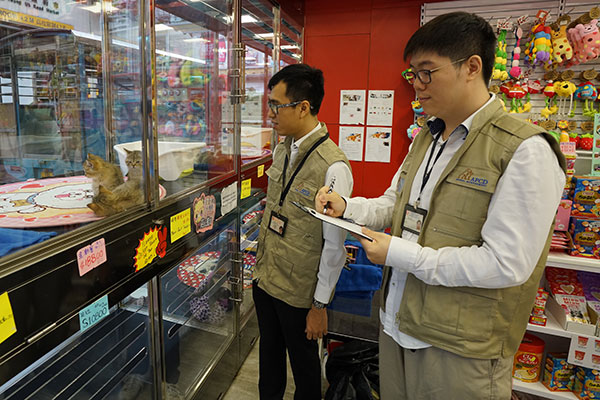
Under the law, all animal traders are required to obtain Animal Trader Licences (ATLs) and should strictly observe the corresponding licensing conditions. Pet shops are required to obtain animals for sale only from approved sources. The Department inspects these shops regularly to ensure that they do not contravene any of the licensing conditions. In 2017-18, 341 ATLs were issued, covering the trade of dogs, cats, birds, reptiles, etc.
With a view to enhancing animal welfare and protecting animal and public health, the amended Public Health (Animals and Birds) (Trading and Breeding) Regulations came into effect on 20 March 2017 to strengthen regulation on animal trading and dog breeding. Under the amended regulations, any person who sells a dog, whether or not it is kept by that person as a pet, requires a licence or permit. A person who keeps a female dog for breeding purpose and sells, or offers to sell, that dog or its offspring requires a dog breeder licence. In 2017-18, 32 Dog Breeder Licences were issued.
Since 2011, the Department has been collaborating with animal welfare organisations to implement a "Capture-Sterilise-Relocate" programme for stray cattle in Sai Kung and Lantau Island with a view to controlling their population in the long run. This helps minimise the nuisance and danger potentially caused by stray cattle to the public while at the same time safeguard their welfare. Up to 31 March 2018, 427 cattle/buffalo were neutered and 562 heads were relocated.
The three-year Stray Dog "Trap-Neuter-Return" Trial Programme concluded at the beginning of 2018. The Society for the Prevention of Cruelty to Animals (SPCA) and the Society for Abandoned Animals will continue to look after the dogs recorded for the trial programme, monitor their numbers and provide the Department with relevant information about these dogs at the Cheung Chau Trial and the Tai Tong Trial Zone respectively in the coming years.
Statistics on animal control and management, and the relevant permits/licences issued are at Appendix 11.
ANIMAL WELFARE
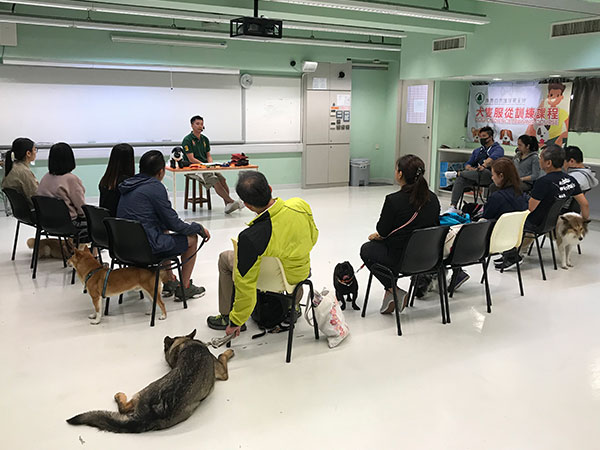
To improve the handling of animal cruelty reports or complaints, an animal welfare task force involving the Department, other government departments and the SPCA was set up. The task force meets regularly and reviews the handling of animal cruelty cases to ensure that the welfare of animals involved is well protected.
During the year, the Department organised a wide range of public education and publicity activities to promote animal welfare. They included "Pets With Love" Dog Adoption Carnival, five publicity joint events with other voluntary organisations, five dog training courses, 91 seminars at schools and estates, 34 roving exhibitions and four roving exhibitions in pet gardens.
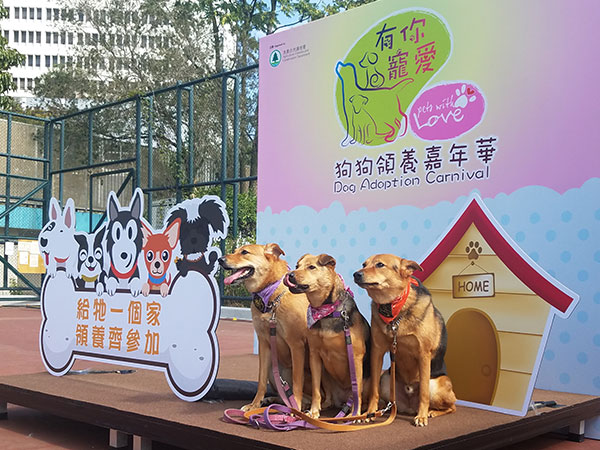
The Department produced another ten-episode TV programme "Pets with Love" for broadcasting on buses to promote rehoming of pets and Responsible Pet Ownership. The videos were added to the YouTube Channel "AFCD Animal Management" and the website of Animal Management Division of the Department.
The Department continues to provide lending service of digital video players loaded with Announcements in the Public Interest and educational videos, education panels and game booths to schools, estates and organisations to promote care for animals and responsible pet ownership.
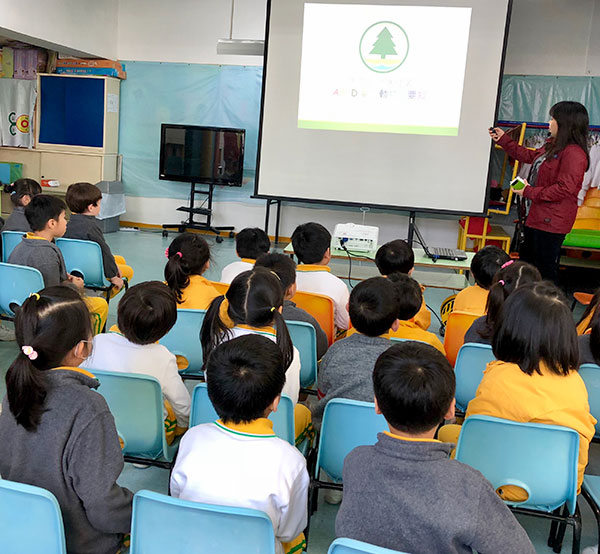
Copies of an educational leaflet in five languages were provided to domestic helpers to help disseminate the dos and don'ts for handling dogs in public places. Leaflets and posters were also distributed to the construction industry to help disseminate the code of practice for keeping dogs on construction sites.
The Department collaborates with partnering Animal Welfare Organisations (AWOs) in promoting animal welfare and rehoming animals. Free de-sexing services for rehomed animals are provided through these AWOs. The Department also provides financial assistance for AWOs to organise relevant educational and promotional programmes. In this regard, the Department has set aside $1.5 million for application by AWOs in 2017-18 for the enhancement of animal management and promotion of animal welfare.